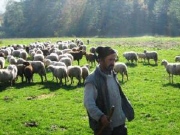 The proposed ban against transhumance is symptomatic of the Romanian government’s attitude towards the peasantry, but it goes against the values of the EU.
The proposed ban against transhumance is symptomatic of the Romanian government’s attitude towards the peasantry, but it goes against the values of the EU.
It would be really tragic if Romania banned transhumance (the ancient practise of taking huge flocks of sheep to mountain pastures for the summer) . Although the practise may contravene some of the EU’s public health rules, there is a strong tendency within the EU to suport traditional cultural practises within EU member states, to encourage diversity as well as environmentally friendly activities.
Transhumance is an ancient practise which not only offers employment in the countryside, where jobs are rare and emigration high, but it is of real interest to the rapidly growing number of people who are interested in environmentally friendly lifestyles.
For a long time those of us working on EU projects have known that Romania simply agreed to all the conditions that came with EU membership. Scores of international consultants pointed out that the other new members states would study each provision, consider its impact, and then negotiate. An example of this is visa policies: Poland refused to follow the EU norm of applying visas to Ukraine and it was agreed that they could keep coming to Poland without visas. Romania, by contrast, spoiled its reputation with Serbia (not to mention Moldova and Turkey) by meekly applying the EU visa rules without any thought. The Nastase government were so desperate to claim the credit for EU integration that they didn’t bother seriously negotiating on behalf of their people or their neighbours.
The transhumance scandal is the latest chapter in this practise of blind acceptance of EU rules, and the the irony is that Brussels would probably have been more sympathetic to the Romanian shepherd than Bucharest is. It is clear to those of us who have worked with Romanian government officials that they have little respect for people living in the countryside; just look at the state of schools in Romania’s villages, the lack of services and the lack of incentives and policies which actually help the people that are living there.
The fact that almost 40% of Romania’s population live in the countryside does not seem to be a worry for the policymakers in Bucharest. What happens if their way of life is made illegal and it becomes economically impossible to survive in the village? What will happen if millions more peasants come to the cities, expecting jobs that they will never qualify for, asking for social assistance and housing? None of these scenarios seem to be under consideration in Romania and the impression is that these people simply don’t matter.
One agricultural expert from the UK once told me about a conversation he had had at the Ministry of Agriculture in Bucharest. He asked an official what was their policy on subsistence farmers. The official looked blank for a while and then said, sotto voce, “don’t worry, the rural population are poor and old. Soon they will be dead.” That was the closest he could get to a policy statment.
In the EU member states the depopulation of the rural areas is of real concern to policymakers, and big resources are invested in developing all sorts of alternative sources of income. Although the French have been most succesful at this, there are interesting examples from all EU member states of how traditional and modern lifestyles were supported in the countryside. One example from my own country is from the north of Scotland, an area that was so depopulated that it was virtually empty. With the help of EU funds, the British government invested in new telecommunication lines, internet and business centres in villages, and for some years now people from London have been relocating to the Highlands — which has almost become a fahionable place to live.
However, only 2% of the British population live in the countryside and many people are sad that we have lost many of our traditions as a result of generations of urbanisation. Now that global warming and environmental issues are becoming more important, people are starting to look again at living in the countryside, but in UK we cannot witness people who are actually doing it. We can only look at the rural way of life in books and museums, and when Britons visit Romania they are enchanted by the villages. It is a way of life that we seem to appreciate more than Romanians do, a fact that often bewilders our Romanian hosts. It is a way of life that — if lost — cannot be recreated with government subsidies.
By Rupert Wolfe Murray